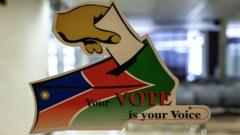As incumbents in various African nations face mounting electoral losses, 2024 has seen significant shifts in political power, influenced by rising public dissatisfaction with economic conditions and governance failures. The implications for ruling parties like Namibia's Swapo and South Africa's ANC uncover a broader trend in citizen activism for accountability.
Electoral Trends Signal Challenges for Africa's Long-Standing Ruling Parties

Electoral Trends Signal Challenges for Africa's Long-Standing Ruling Parties
Sub-Saharan Africa experiences a surge in opposition victories, raising questions about long-term governance stability amidst economic and political discontent.
Amidst rising discontent with economic conditions and governance, 2024 has emerged as a pivotal year for electoral politics in sub-Saharan Africa, showcasing significant challenges for long-standing ruling parties. The recent presidential elections in Namibia marked a notable, albeit shaky, victory for the Swapo party, which has dominated since the country's independence in 1990. Candidate Netumbo Nandi-Ndaitwah secured 57% of the vote, becoming the nation’s first female leader, yet the party’s grip appears to be diminishing, having lost significant parliamentary seats—12 out of 63—earlier this year. This paradox in election results has led opposition parties to question the legitimacy of the elections, citing various logistical issues and irregularities.
Wider electoral woes have plagued incumbents throughout the region, signaling a year of upheaval. Countries such as Botswana and Mauritius exemplified the pushback against entrenched powers, with the Botswana Democratic Party (BDP) suffering a record low, dropping to just four parliamentary seats from 38, and Mauritius' governing coalition collapsing under the weight of opposition triumphs. The opposition in Mauritius set a remarkable precedent, winning 60 out of 66 parliamentary seats. Even amidst strife, the political climate in Senegal shifted dramatically, reversing the hold of President Macky Sall when opposition leaders, previously imprisoned, secured victory despite governmental attempts to suppress dissent.
While some governments retained power, like South Africa's African National Congress (ANC), their bargaining position weakened sharply following electoral setbacks that saw them garner less than 50% of the votes for the first time since apartheid's end. This compelled coalition agreements, a significant dilution of their power and control.
The common thread through these electoral outcomes lies in public sentiment, notably frustration regarding corrupt governance, economic mismanagement, and escalating living costs. Observations indicate that dissatisfaction over inflation and other economic hardships stimulated protests, as seen in Kenya earlier this year, closely mirroring global trends where economic distress has led to political upheaval.
Public demand for accountability is not merely a regional phenomenon; it aligns with global discontent towards government performance. The shift of power in several African nations reveals a region demonstrating remarkable resilience in democracy, challenging the narrative of widespread authoritarianism. As opposition parties adapt strategies to safeguard electoral processes and unite diverse factions, effectiveness in mobilization could reshape the political landscape leading to future elections, including upcoming contests in Ghana and Malawi.
The past year in sub-Saharan Africa lays bare the complexities of political transitions amidst global democratic decline. The rapid pace of change within the region’s political dynamics suggests a burgeoning democratic spirit, characterized by civil society's dedication to holding administrations accountable and reflecting the will of the electorate. As these trends unfold, they present critical lessons for international audiences and activists invested in nurturing democracy across the globe.




















